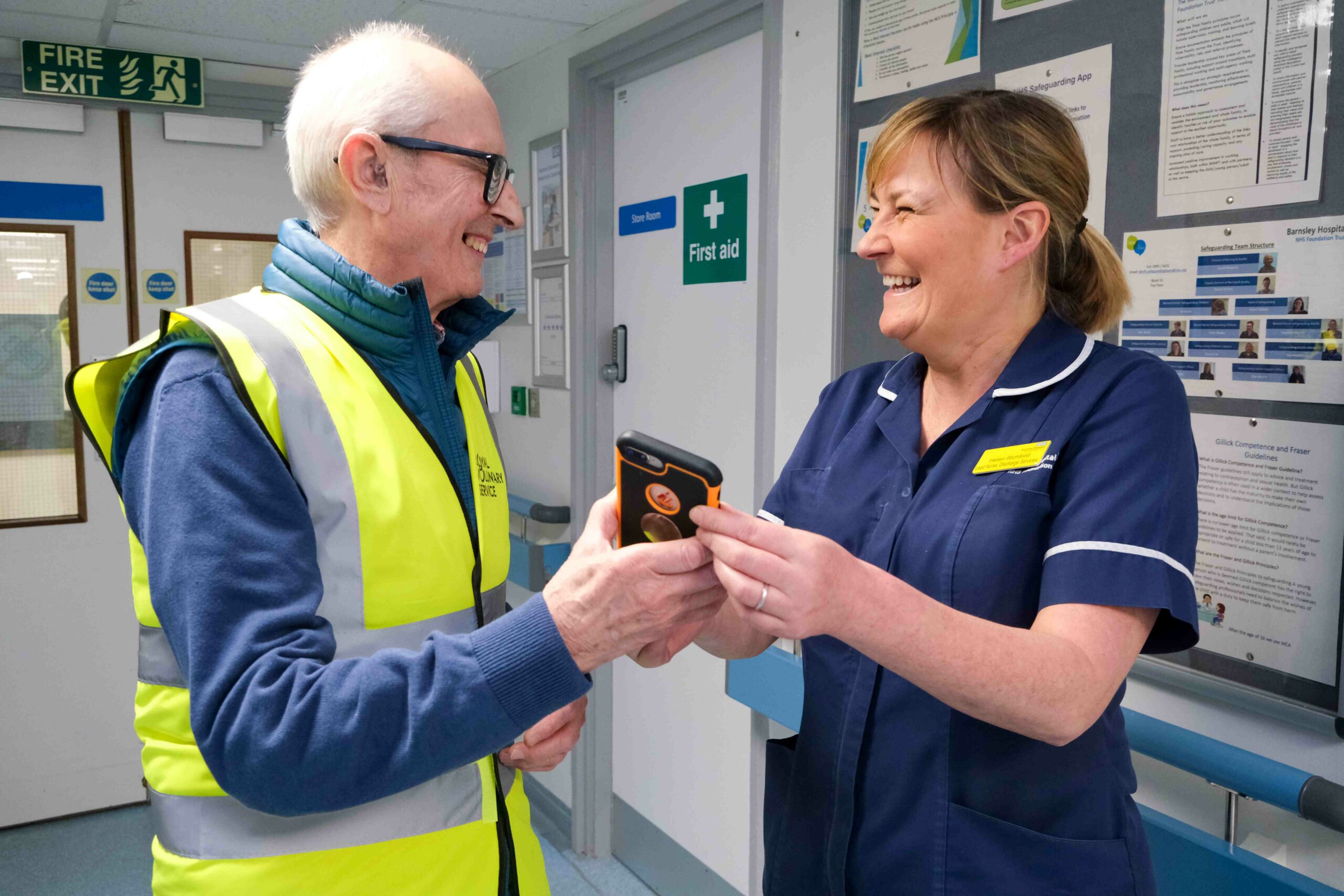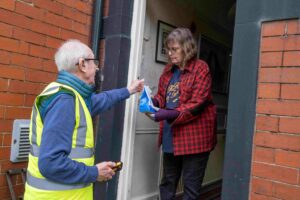Harnessing local assets – the NHS and Care Volunteer Responders programme: people powered healthcare

By Dr Allison Smith, Head of Research and Insight at Royal Voluntary Service.
The NHS and Care Volunteer Responders (NHSCVR) programme was first launched in March 2020 by NHS England to support and protect those individuals who were ‘shielding’ because of clinical vulnerabilities to Covid-19. The programme proved to be a critical auxiliary service adding vital capacity for staff and patients. Today the programme aims to support integrated care systems (ICSs) alongside other voluntary sector provision to improve efficiency, patient care and add capacity. It is free of charge, making it an accessible resource for healthcare teams and patients seeking additional support.
In today’s healthcare landscape, collaboration across sector partnerships is essential to delivering high quality care. NHSCVR exemplifies partnership working between a public service, a charity with a social enterprise (GoodSAM digital app) and citizens. To date over 40,000+ vetted volunteers across England have made themselves available to be deployed in real-time – via the GoodSAM app – to support the needs of local healthcare systems.
Volunteers provide emotional (e.g. welfare calls) and practical support (e.g. grocery/prescription deliveries) to help people stay well and independent. In addition, volunteers play a crucial role in supporting healthcare teams with, for example, quicker discharges and virtual ward assistance through the Pick Up and Deliver service.
Since the programme was relaunched last year, Royal Voluntary Service, with GoodSAM, has been working in partnership with several Trusts, ICSs, and local volunteers to embed and pilot various volunteer activities.
We showcase two below.
Barnsley Hospital – Pick Up and Deliver
The service supports Barnsley Hospital’s Discharge Unit, Virtual Wards, and Haematology Departments. This supports individuals being discharged from the hospital by transporting medication to their homes and enables patients to return home earlier, rather than them waiting for their prescriptions to be ready.

Barnsley Hospital staff load Pick Up and Deliver shifts into the referrer online portal. With real-time support the system ensures fast volunteer deployment. Volunteer Responders across the North-East sign up for shifts via the GoodSAM app, enjoying the flexibility to choose when they volunteer. Discharge staff feel that it both improves patient flow by getting patients off the wards and home quicker but also saves bed days by reducing the number of patients still waiting on-ward past 5pm.
Kerry Evans, the Regional Relationship Manager for North East, North Cumbria and Yorkshire has been working in partnership with Barnsley Hospital and their Discharge Unit and Virtual Ward teams:
“Members of their Discharge/Virtual Ward Teams approached me to see how Volunteer Responders could assist with the delivery of medications. It was a real collaborative effort from the start, involving hospital departments and the Royal Voluntary Service.
“Initially, we implemented an alert-based notification system for volunteers to respond to individual requests. After one month, we gathered feedback and assessed the process. It became clear that the volume of deliveries warranted a shift-based model. This provided hospital staff with greater certainty about volunteer attendance and allowed for contingency plans if shifts were unfilled.
“Volunteers have appreciated knowing their scheduled times, resulting in consistent participation. This has fostered trust and rapport between hospital staff and volunteers. The immediate impact of their actions within their communities has further motivated volunteers.
“The hospital staff have embraced the service and have been happy to explain to other Trusts about the benefits they have experienced and the collaborative nature of working with the voluntary sector. So much so, other Trusts are coming on board.
“It really is a case of listening to what the hospital needs, engaging with the volunteers to fully explain the service and then supporting all parties to make sure the process runs smoothly.”
Jacqueline Howarth, Operational Manager of RightCare Barnsley said:
“We are exploring the possibility of expanding the service to other patient groups and are in the early stages of developing these new pathways. Additionally, we are looking into other services provided by NHS and Care Volunteer Responders that would be useful to our Virtual Wards.
“We have found the Pick Up and Deliver service to be incredibly helpful and necessary. We have already recommended it to other colleagues and department heads in the hospital. The service is available seven days a week and is highly responsive, which is fantastic”.
Yorkshire Ambulance Service – Welfare Vans
The programme also worked in partnership with Yorkshire Ambulance Service NHS Trust and local volunteers to pilot ‘welfare vans’ in October and November 2023 (at York Hospital) to improve the wellbeing and working environment of ambulance crews as they waited outside A&E.
The volunteers were asked to make themselves available to support crews who were waiting to hand over patients at Accident & Emergency departments. They were required to provide ambulance staff with refreshments and the opportunity for a friendly chat. Volunteers undertook shifts of two to four hours – either solo or in pairs; the welfare vans were available from 12:00 to 20:00 and had a range of hot/cold drinks and snacks.
Overwhelmingly, both ambulance crews and volunteers benefited from this role. Crews reported high satisfaction with the welfare vans (n=89): 88 per cent reported that they were ‘very satisfied’ and 9 per cent ‘satisfied’.
“Always a friendly face at the welfare van. Happy to help and chat … A very welcome sight during a busy shift. Very much appreciated.”
“It’s an excellent service, with all the queuing we do to have a friendly face to give you a warm cuppa is great. All the volunteers at York are friendly and helpful so please keep it going. A big thank you to them.”
Volunteers also reported high levels of appreciation and value in doing this activity:
“I just got a really nice feeling about it, and they did appreciate it. They were keen to say thank you very much for being here … ‘We didn’t know you were going to be here.’
“I thought it was a really good idea to do. And so I was quite keen to sign up to it. So I did! They (crews) appreciated it, and it was nice to have an opportunity to chat to them.”
These examples demonstrate what can be achieved with true partnership working. Being able to welcome in local citizens, via volunteering, not only has benefits for the healthcare system, staff, and patients but we also know from an existing breadth of medical evidence it improves health and wellbeing of the volunteers, and can drive future workforce recruitment. In a recent survey (March 2024, n=2817) 21 per cent of Volunteer Responders stated that the programme has inspired them to ‘think’ or ‘actively look’ for a job/career in the NHS/care; 4 per cent stated because of NHSCVR they are now working in the NHS/care.
Royal Voluntary Service will be attending the Integrated Care Delivery Forum event in Birmingham on the 9th May.
If you would like further information or a conversation with one of our team – please contact your Regional Relationship Manager; details can be found at nhscarevolunteerresponders.org.